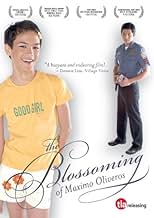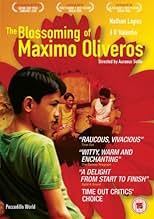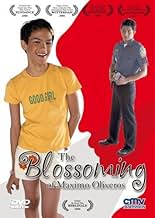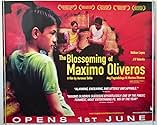L'éveil de Maximo Oliveros
Titre original : Ang pagdadalaga ni Maximo Oliveros
- 2005
- Tous publics
- 1h 40min
NOTE IMDb
6,9/10
1,7 k
MA NOTE
Ajouter une intrigue dans votre langueA young boy falls in love with a handsome policeman who is investigating his family's criminal activities.A young boy falls in love with a handsome policeman who is investigating his family's criminal activities.A young boy falls in love with a handsome policeman who is investigating his family's criminal activities.
- Réalisation
- Scénario
- Casting principal
- Récompenses
- 24 victoires et 28 nominations au total
JR Valentin
- Victor Perez
- (as J.R. Valentin)
Jett Desalesa
- Leslie - Maxi's friend
- (as Sir Jett Desalesa)
Avis à la une
Is Maxi Gay? Well, he dresses like a girl and has a crush on a hunky policeman. But as the story develops one has to wonder whether Maxi is actually a gay preteen or just a troubled boy in a difficult situation. Does it matter? Not really.
After the death of his mother due to an unknown illness Maxi has taken over her role in taking care of his two brothers and father, all petty thieves. The arrangement seems to work fine. Maxi delights in cooking and cleaning for his family and enjoys a playing Miss Phillipines with his "girl" friends. But everything changes when a hunky young cop arrives. Maxi develops a crush and is forced to choose between his family and his feelings for the cop. Needless to say thinks get complicated and even turn ugly and violent.
This film impressed me when I saw it at a screening at the International Filmfestival Rotterdam. There are faults but mainly the film is strong and well executed. The acting is impressive, although Maxi starts out a bit of a stereotypical screaming queen.
If anything the film is a bit too long, there are several moments that could be deleted without much effect. Also the quality of the picture and sound is understandably not up to western standards, although this does not distract from the story and I have seen much worse.
One of the questions I am left with is whether this accurately portrays Philipine's attitude towards (effeminate) homosexuality. If so that is to be commended, however it is hard to imagine such utter and complete tolerance, not only of Maxi but also of his friends. In a film with such a premise one sort of expects some exploration of the subject. However the lack thereof does not affect the story, it may even make it stronger.
I hope you will go see this movie, if you get the chance!
After the death of his mother due to an unknown illness Maxi has taken over her role in taking care of his two brothers and father, all petty thieves. The arrangement seems to work fine. Maxi delights in cooking and cleaning for his family and enjoys a playing Miss Phillipines with his "girl" friends. But everything changes when a hunky young cop arrives. Maxi develops a crush and is forced to choose between his family and his feelings for the cop. Needless to say thinks get complicated and even turn ugly and violent.
This film impressed me when I saw it at a screening at the International Filmfestival Rotterdam. There are faults but mainly the film is strong and well executed. The acting is impressive, although Maxi starts out a bit of a stereotypical screaming queen.
If anything the film is a bit too long, there are several moments that could be deleted without much effect. Also the quality of the picture and sound is understandably not up to western standards, although this does not distract from the story and I have seen much worse.
One of the questions I am left with is whether this accurately portrays Philipine's attitude towards (effeminate) homosexuality. If so that is to be commended, however it is hard to imagine such utter and complete tolerance, not only of Maxi but also of his friends. In a film with such a premise one sort of expects some exploration of the subject. However the lack thereof does not affect the story, it may even make it stronger.
I hope you will go see this movie, if you get the chance!
Although the main character is gay, this is not a gay film. The beauty of the film is that it does not make fun of the gay character. Maxi is well-loved and accepted by his family and the community.
There is plenty of humor but this light treatment of the story does not at all trivialize the message that the film wants to bring across to the audience. Scriptwriter Michiko Yamamoto who also wrote the award-winning "Magnifico" has improved her skill in storytelling and is not at all melodramatic this time. She has done away with subplots that don't move the main story much, a weakness of many Filipino scriptwriters who want to tell everything, including the entire history of the Philippines, in one movie. Her characters are all balanced no one is all-evil or all-saint. The most touching scenes are those that show the tenderness of Maxi's tough-guy family to him. However, there are technical glitches that need to be fixed, and with digital technology editing may still be possible, e.g. scenes that are too dark or the screen going black for too long, making the oldies in the audience worry that perhaps the "lagarista" has been caught in traffic with the next roll of film. It is not often that Filipinos abroad get to see a rare gem like this film. Thanks to digital film-making and indie cinema and the film festivals in many countries.
There is plenty of humor but this light treatment of the story does not at all trivialize the message that the film wants to bring across to the audience. Scriptwriter Michiko Yamamoto who also wrote the award-winning "Magnifico" has improved her skill in storytelling and is not at all melodramatic this time. She has done away with subplots that don't move the main story much, a weakness of many Filipino scriptwriters who want to tell everything, including the entire history of the Philippines, in one movie. Her characters are all balanced no one is all-evil or all-saint. The most touching scenes are those that show the tenderness of Maxi's tough-guy family to him. However, there are technical glitches that need to be fixed, and with digital technology editing may still be possible, e.g. scenes that are too dark or the screen going black for too long, making the oldies in the audience worry that perhaps the "lagarista" has been caught in traffic with the next roll of film. It is not often that Filipinos abroad get to see a rare gem like this film. Thanks to digital film-making and indie cinema and the film festivals in many countries.
Just by watching this film, one can understand inside-out about what's going on in a so-called developing country. All the odds. All the blurry lines. And the great parallel of morality and survivability. This film tells a life story well beyond homosexuality and human attraction, as indicated in the camouflage. Maximo or Maxi represents every soul on earth, who needs time, and perhaps a tragedy, to comprehend the life bestowed on him by others, and another life he may be given a chance to choose. His criminal but ultimately decent family is on one side, and the naively honest and devilishly handsome police officer on the other. And, to cry out loud, he is only 12 years old, living in a slum area and without a mother. Forcing him to choose is cruel. I myself am from Thailand. Not so different from the Philippines portrayed excellently here. I think I can relate very well to the sense of trapping one may feel, having born into a brothel of life like that. I dare an inexperienced westerner to predict the film plot, and how it might end. I do not think you can figure out one move to another. This film is honest, with the story well-told and incredibly fair. It should be nominated for major film awards on behalf of ASEAN, as opposed to the Philippines alone, as it tells an ASEAN story, except for Singapore, as few films can. Maximo walks past the charming Victor on his way to re-enter school. Believe it or not, it is indeed a hard decision to make, in a society less than fair and democratic. He is indeed blossoming.
One can seldom discuss gay Filipino films without mentioning the Lino Brocka classic, "Macho Dancer". For a long time the film lorded over all the others in gay filmdom (or is it 'film gaydom'?). Sure there were competent ones like "Aishite Masu" and "Markova: Comfort Gay" but they were never thisclose to "Macho". Could "Ang Pagdadalaga ni Maximo Oliveros" finally be the one true contender for the throne?
Director Aureus Solito and writer Michiko Yamamoto have crafted a very likable coming of age story. The treatment of Maximo Oliveros' (Nathan Lopez) homosexuality is unique and refreshing for it is never questioned nor made an issue, just a fact as true as the sky is blue. It's a huge credit to the filmmakers for not resorting to easy laughs at the expense of gay characters. Camp is absolutely present but it's never overdone. In fact, I think one of the main reasons why the film works so well is because the whole film isn't overdone. The filmmakers know when to pull back just before a scene turns mushy or heavyhanded. Even something as elaborate as the mini-pageant scene is cut long enough to avoid unnecessary melodrama.
One of the film's most interesting aspects for a lot of viewers is the seemingly astonishing possibility that an effeminate homosexual can exist relatively peacefully in the slums, aka Hoodlum Central. Although I haven't seen this myself, I am convinced that cultural mores make this scenario very possible. Despite the influence of homophobic Roman Catholicism, the general mood in the country is situated somewhere between amusement, acceptance, and tolerance (though not immune to occasional spurts of homophobia). Let us not forget that pre-Spanish Philippine culture respected the 'babaylan', a gay priest(ess) of sorts.
The homoerotic love angle is beautifully handled, in my opinion. To start with, the leads are perfect. Lopez carries the film as Maximo while JR Valentin as the cop is hunky yet brotherly, respectable as necessary but not too antiseptic. You get a sense of hero worship, excessive caring, and strong attraction from the side of Maximo while from the other side you see a fraternal sense of caring, naivete, and a culturally-imbibed politeness that supersedes any possible homophobia. There's also a delicious hint of ambiguity in his sexuality. There are a number of memorable scenes between the two, but a brief, well-handled, but highly erotic one (which, under a weaker filmmaker, could've easily bordered on pedophilia considering Maximo's age) and the emotionally satisfying ending stand out the most.
Despite the fact that Maximo Oliveros is unapologetically gay the film isn't strictly gay-themed unless you consider puppy love, unrequited love, familial obligations, and economic struggles as such.
It was a proud moment to watch a Filipino film in the prestigious Lincoln Center New Films/New Directors series in New York City. It was icing on the cake to see someone from the Univ. of the Philippines do good, in the gay arena, no less. "As good as Hollywood films"? I say better. When did Hollywood ever show us a coming of age story with a gay lead character?
Director Aureus Solito and writer Michiko Yamamoto have crafted a very likable coming of age story. The treatment of Maximo Oliveros' (Nathan Lopez) homosexuality is unique and refreshing for it is never questioned nor made an issue, just a fact as true as the sky is blue. It's a huge credit to the filmmakers for not resorting to easy laughs at the expense of gay characters. Camp is absolutely present but it's never overdone. In fact, I think one of the main reasons why the film works so well is because the whole film isn't overdone. The filmmakers know when to pull back just before a scene turns mushy or heavyhanded. Even something as elaborate as the mini-pageant scene is cut long enough to avoid unnecessary melodrama.
One of the film's most interesting aspects for a lot of viewers is the seemingly astonishing possibility that an effeminate homosexual can exist relatively peacefully in the slums, aka Hoodlum Central. Although I haven't seen this myself, I am convinced that cultural mores make this scenario very possible. Despite the influence of homophobic Roman Catholicism, the general mood in the country is situated somewhere between amusement, acceptance, and tolerance (though not immune to occasional spurts of homophobia). Let us not forget that pre-Spanish Philippine culture respected the 'babaylan', a gay priest(ess) of sorts.
The homoerotic love angle is beautifully handled, in my opinion. To start with, the leads are perfect. Lopez carries the film as Maximo while JR Valentin as the cop is hunky yet brotherly, respectable as necessary but not too antiseptic. You get a sense of hero worship, excessive caring, and strong attraction from the side of Maximo while from the other side you see a fraternal sense of caring, naivete, and a culturally-imbibed politeness that supersedes any possible homophobia. There's also a delicious hint of ambiguity in his sexuality. There are a number of memorable scenes between the two, but a brief, well-handled, but highly erotic one (which, under a weaker filmmaker, could've easily bordered on pedophilia considering Maximo's age) and the emotionally satisfying ending stand out the most.
Despite the fact that Maximo Oliveros is unapologetically gay the film isn't strictly gay-themed unless you consider puppy love, unrequited love, familial obligations, and economic struggles as such.
It was a proud moment to watch a Filipino film in the prestigious Lincoln Center New Films/New Directors series in New York City. It was icing on the cake to see someone from the Univ. of the Philippines do good, in the gay arena, no less. "As good as Hollywood films"? I say better. When did Hollywood ever show us a coming of age story with a gay lead character?
Though its a thoroughly Catholic-dominated country, the Philippines is said to have a more lax attitude towards "the gay" than other more liberal, democratic countries, like the one I live in. Many point to its cinema as evidence of this. Of course, this is from the outside looking in. LGBT folks, particularly the effeminate "bakla" male, might be commonplace in Philippine film, but the ones we don't see on screen face a particular type of oppression. They are often an object of ridicule, stereotyped as shallow, loud-talking and outrageously "mayabang," and usually sex-crazed. And a lot of folks, gay or straight, eat it up.
Despite its deceptive marketing (from the DVD cover/promo poster to the trailer), Auraeus Solito's Ang Pagdadalaga ni Maximo Oliveros/The Blossoming of Maximo Oliveros (2006) isn't at all about a flamboyantly gay boy's crush on the hunky neighborhood police officer that happens to be set in a third world barrio. The story is the barrio, and all its contradictions, initially dressed up as a neorealist comedy evoking both Lino Brocka and Bagets at once before taking a darker turn halfway through.
Like all good (worthwhile) Philippine stories, its aware of acute third world contradictions without overtly speaking on it. If Brillante Mendoza's work emphasizes people's idealism despite wretched conditions, Solito's flips the formula. His Philippines is one where the people are wretched but the settings, still unmistakably impoverished, can also be a magical, wonderfully pastel-colored place.
Maxi (Nathan Lopez) is 12-years old, gay, and plays surrogate mother to his family of petty thieves: tatay Paco (Soliman Cruz) and his older brothers Boy and Bog. The barrio is his playground, until one night he's assaulted by some knuckleheads. Policeman Victor (JR Valentin) comes to his rescue, and they become friends much to his family's objection. Matters complicate when Boy ends up killing somebody in a botched robbery attempt. Lopez brings remarkable ease to the title character, embodying urban poor Philippines with simplicity and struggle. His selfless need/want to care for others is carried by a fragile balance between a naive confidence of who he is and a growing insecurity of where he is (and where he's heading). He dreams in a bubble in the process of bursting, asking his father "Wala na bang ibang paraan itay?" (Is there no other way, dad?)
On the surface, he's nothing like his macho, gun-toting father. However, beneath the princess demeanor, he is his father's son, perhaps more so than his brothers. Conditions have forced Paco to consider what is more dignified: starving with a factory job, or getting by as a petty thief. Maxi has inherited his father's most lasting trait: a commitment to keep the family together. Or at least fed, clothed and sheltered, even if it means doing the "wrong" thing. Thus, Maxi's "blossoming" has less to do with dealing with his rejected affections for Victor and more with facing down the reality of his family's livelihood.
Restrained by necessity rather than stylistic choice, Solito shows us what could be done with a digital camera, $10,000US and 13 days of shooting. It's a style of film that can never be overdone in the Philippines, where lack of support from the media industry and government and resources forces an organic creativity.
Solito's execution is matched by writer Michiko Yamamoto's (Magnifico, 2003) gift for compact, delightful drama/comedy without teetering to far in either direction. Thanks to this collaboration, Ang Pagdadalaga ni Maximo Oliveros is a leap forward from the gay caricatures we've gotten too used to, and yet another piece of a compelling argument that Philippine cinema isn't all cornball and melodrama. Or, that a movie can still have those elements and not be shitty.
Despite its deceptive marketing (from the DVD cover/promo poster to the trailer), Auraeus Solito's Ang Pagdadalaga ni Maximo Oliveros/The Blossoming of Maximo Oliveros (2006) isn't at all about a flamboyantly gay boy's crush on the hunky neighborhood police officer that happens to be set in a third world barrio. The story is the barrio, and all its contradictions, initially dressed up as a neorealist comedy evoking both Lino Brocka and Bagets at once before taking a darker turn halfway through.
Like all good (worthwhile) Philippine stories, its aware of acute third world contradictions without overtly speaking on it. If Brillante Mendoza's work emphasizes people's idealism despite wretched conditions, Solito's flips the formula. His Philippines is one where the people are wretched but the settings, still unmistakably impoverished, can also be a magical, wonderfully pastel-colored place.
Maxi (Nathan Lopez) is 12-years old, gay, and plays surrogate mother to his family of petty thieves: tatay Paco (Soliman Cruz) and his older brothers Boy and Bog. The barrio is his playground, until one night he's assaulted by some knuckleheads. Policeman Victor (JR Valentin) comes to his rescue, and they become friends much to his family's objection. Matters complicate when Boy ends up killing somebody in a botched robbery attempt. Lopez brings remarkable ease to the title character, embodying urban poor Philippines with simplicity and struggle. His selfless need/want to care for others is carried by a fragile balance between a naive confidence of who he is and a growing insecurity of where he is (and where he's heading). He dreams in a bubble in the process of bursting, asking his father "Wala na bang ibang paraan itay?" (Is there no other way, dad?)
On the surface, he's nothing like his macho, gun-toting father. However, beneath the princess demeanor, he is his father's son, perhaps more so than his brothers. Conditions have forced Paco to consider what is more dignified: starving with a factory job, or getting by as a petty thief. Maxi has inherited his father's most lasting trait: a commitment to keep the family together. Or at least fed, clothed and sheltered, even if it means doing the "wrong" thing. Thus, Maxi's "blossoming" has less to do with dealing with his rejected affections for Victor and more with facing down the reality of his family's livelihood.
Restrained by necessity rather than stylistic choice, Solito shows us what could be done with a digital camera, $10,000US and 13 days of shooting. It's a style of film that can never be overdone in the Philippines, where lack of support from the media industry and government and resources forces an organic creativity.
Solito's execution is matched by writer Michiko Yamamoto's (Magnifico, 2003) gift for compact, delightful drama/comedy without teetering to far in either direction. Thanks to this collaboration, Ang Pagdadalaga ni Maximo Oliveros is a leap forward from the gay caricatures we've gotten too used to, and yet another piece of a compelling argument that Philippine cinema isn't all cornball and melodrama. Or, that a movie can still have those elements and not be shitty.
Le saviez-vous
- AnecdotesJoey Pepe Smith who plays the piano man being teased by the kids is the one who scored the film.
- ConnexionsReferenced in Ako ang simula: The ABS-CBN News and Current Affairs Yearend Special (2006)
- Bandes originalesMy Country, My Philippines
Written and Performed by Yoyoy Villame
Meilleurs choix
Connectez-vous pour évaluer et suivre la liste de favoris afin de recevoir des recommandations personnalisées
- How long is The Blossoming of Maximo Oliveros?Alimenté par Alexa
Détails
- Date de sortie
- Pays d’origine
- Sites officiels
- Langues
- Aussi connu sous le nom de
- The Blossoming of Maximo Oliveros
- Lieux de tournage
- Sociétés de production
- Voir plus de crédits d'entreprise sur IMDbPro
Box-office
- Montant brut aux États-Unis et au Canada
- 28 041 $US
- Week-end de sortie aux États-Unis et au Canada
- 6 690 $US
- 24 sept. 2006
- Montant brut mondial
- 38 691 $US
- Durée
- 1h 40min(100 min)
- Couleur
Contribuer à cette page
Suggérer une modification ou ajouter du contenu manquant


























